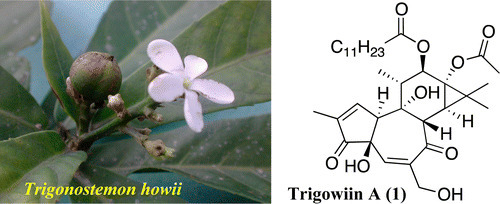Prostratin and 12-O-Tetradecanoylphorbol 13-Acetate Are Potent and Selective Inhibitors of Chikungunya Virus Replication
See on Scoop.it – Virology and Bioinformatics from Virology.ca
A chemical study of the Vietnamese plant species Trigonostemon howii led to the isolation of a new tigliane-type diterpenoid, trigowiin A (1), along with several known coumarins and phenylpropanoids. The planar structure and the relative configuration of compound 1 were elucidated based on spectroscopic analysis, including 1D- and 2D-NMR experiments, mass spectrometry, and comparison with literature data. Trigowiin A (1) exhibited moderate antiviral activity in a virus-cell-based assay for Chikungunya virus (CHIKV). Since the structure of compound 1 is closely related to those of well-known tigliane diterpenoids such as prostratin (2), phorbol (3), 12-O-tetradecanoylphorbol 13-acetate (TPA) (4), and 4α-TPA (5), the antiviral activity of the latter compounds was also evaluated against CHIKV, as well as in virus-cell-based assays of two additional members of the genus Alphavirus (Sindbis virus, SINV, and Semliki forest virus, SFV). Whereas prostratin inhibited CHIKV replication with a moderate EC50 of 2.6 μM and a selectivity index (SI) approximating 30, compound 4 proved to be an extremely potent inhibitor, with an EC50 of 3 nM and a SI near 2000. Interestingly, no or very little activity was observed on the replication of SINV and SFV.
Mélanie Bourjot, Leen Delang, Van Hung Nguyen, Johan Neyts, Françoise Guéritte, Pieter Leyssen, and Marc Litaudon
J. Nat. Prod., Article ASAP
DOI: 10.1021/np300637t
Publication Date (Web): December 7, 2012
See on pubs.acs.org
